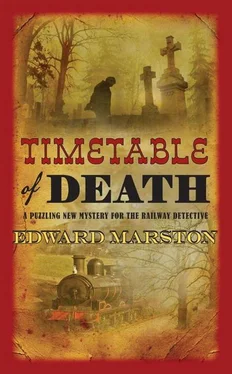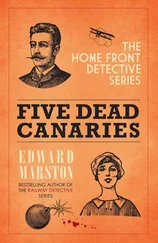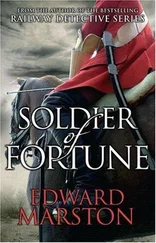Edward Marston - Timetable of Death
Здесь есть возможность читать онлайн «Edward Marston - Timetable of Death» весь текст электронной книги совершенно бесплатно (целиком полную версию без сокращений). В некоторых случаях можно слушать аудио, скачать через торрент в формате fb2 и присутствует краткое содержание. Год выпуска: 2015, ISBN: 2015, Издательство: ALLISON & BUSBY, Жанр: Исторический детектив, на английском языке. Описание произведения, (предисловие) а так же отзывы посетителей доступны на портале библиотеки ЛибКат.
- Название:Timetable of Death
- Автор:
- Издательство:ALLISON & BUSBY
- Жанр:
- Год:2015
- ISBN:9780749018122
- Рейтинг книги:4 / 5. Голосов: 1
-
Избранное:Добавить в избранное
- Отзывы:
-
Ваша оценка:
- 80
- 1
- 2
- 3
- 4
- 5
Timetable of Death: краткое содержание, описание и аннотация
Предлагаем к чтению аннотацию, описание, краткое содержание или предисловие (зависит от того, что написал сам автор книги «Timetable of Death»). Если вы не нашли необходимую информацию о книге — напишите в комментариях, мы постараемся отыскать её.
Timetable of Death — читать онлайн бесплатно полную книгу (весь текст) целиком
Ниже представлен текст книги, разбитый по страницам. Система сохранения места последней прочитанной страницы, позволяет с удобством читать онлайн бесплатно книгу «Timetable of Death», без необходимости каждый раз заново искать на чём Вы остановились. Поставьте закладку, и сможете в любой момент перейти на страницу, на которой закончили чтение.
Интервал:
Закладка:
Stanley Quayle was still unwilling to divulge any new information about the family that might assist the investigation. He simply wanted to portray it in a more favourable light than his brother. He spoke of a loving father who’d imbued his sons with the aspirations that drove them on. While conceding that his brother had been wayward at times, he insisted that Lucas was now following in the Quayle tradition of enterprise. The other reason for coming to Derby was to find out if there had been any developments in the case. Leeming was succinct, explaining that they’d made some encouraging progress but were in no position to make an arrest as yet.
‘What we really need to know is where your father was on the day when he was murdered. Didn’t he keep a diary?’
‘Yes,’ said Quayle, ‘and he filled it in scrupulously. If we could find it, a lot of things would become clearer, but it’s disappeared. You’ll have to manage without it, I fear.’ He sighed. ‘But you do have suspects in mind, I take it?’
‘There are people at whom we’re looking more closely, sir,’ said Leeming, guardedly. ‘That’s all I can tell you.’
‘Mr Haygarth is one of them, I hope. And then, of course, there’s …’
Quayle drew back from mentioning the name of Gerard Burns.
‘That gentleman has been interviewed, sir,’ said Colbeck.
‘He was no gentleman, Sergeant.’
‘But he was a good cricketer, I’m told.’
‘I don’t want to talk about that,’ said the other, curtly. ‘We indulged the fellow in all manner of ways and he repaid us with …’ He gestured with both hands. ‘My brother will have told you about the betrayal we suffered.’
‘We’ve heard about it from all sides, Mr Quayle.’
‘Don’t believe a word that Burns told you.’
‘Yet his version of events was supported by your sister.’
‘What?’ cried the other, aghast. ‘You’ve seen Lydia?’
‘Yes, sir, we did. We tracked her down in London.’ There was fury in the other man’s eyes. ‘Your sister had a right to know what was going on, sir,’ argued Leeming. ‘After all, it’s her father as well as yours.’
Stanley turned away. ‘I don’t want to hear any more.’
‘Your sister has no intention of coming home.’
‘No more!’ snapped Quayle. ‘We have enough problems without getting embroiled in that one again. As far as I’m concerned, my elder sister does not exist.’
‘Your brother takes a different view.’
‘Lucas will do what he’s told.’
‘Don’t you wish to know where Miss Quayle has been since you parted?’
‘The subject is closed, Sergeant, and so is this conversation. I’m sorry that I was unable to see the inspector instead of having to put up with your impertinent questions.’ He got up. ‘I’ll bid you farewell.’
‘One moment,’ said Leeming, also on his feet. ‘There’s another name that’s come to our ears and it’s a most unlikely one. We gather that this person might bear ill will against your father.’
‘Who is it?’
‘Superintendent Wigg.’
‘I’d forgotten him.’
‘Should we treat him as suspect?’
Stanley Quayle pondered. ‘Yes,’ he said at length. ‘Yes, you should.’
Now that the shock of the murder was wearing off in Spondon, people were starting to remember things that had seemed irrelevant at the time. The reporter was therefore able to pick up scraps of information here and there that might be of use to the detectives. Having become a familiar figure in the village, he’d won the trust of most of the inhabitants so they were more ready to confide in him. When his work was done, he strolled towards the railway station with the feeling that his day had been well spent. Before Conway reached the building, however, he saw Jed Hockaday emerging from it. Spotting the reporter, the cobbler bore down on him with a vengeance.
‘I want a word with you,’ he said, angrily.
‘You can have as many as you like,’ replied the other, coolly.
‘Stop telling lies about me to those two detectives.’
‘You’re the one who’s been telling lies, Mr Hockaday. According to you, on the night of the murder, you weren’t even in Spondon. Yet when the sergeant had a word with the stationmaster, he discovered that you got back here on the last train.’
‘I’d been drinking,’ said Hockaday. ‘I was confused.’
‘You were sober in the morning. When you woke up in your own bed, you must have realised that you got back home somehow.’
‘That’s none of your business.’
‘If it’s relevant to the murder investigation, it is my business.’
‘I had nothing to do with the murder,’ said the cobbler, brandishing a fist, ‘so you can stop saying that I did. I never even knew the dead man.’
‘Are you sure?’ challenged Conway.
‘I’m very sure.’
‘What about Mr Haygarth?’
Hockaday glared. ‘Who?’
‘Donald Haygarth — did you know him?’
There was a momentary delay in replying that gave the cobbler away and his manner was shifty. Though he insisted that he was neither friend nor acquaintance of Haygarth, his claim was unconvincing. The question had put him on the defensive and it irked him. He went back on the attack again.
‘Keep away from Spondon,’ he warned.
‘It’s a free country. I can come here, if I want to.’
‘You’re not welcome.’
‘You don’t speak for the whole village,’ said Conway. ‘Most people have been very friendly. They’ve been glad to help, especially as it may get their names in the Mercury .’
Hockaday stepped in close. ‘Don’t spread lies about me — or else.’
‘Are you threatening me, Mr Hockaday?’
‘There’s such a thing as slander.’
Conway laughed. ‘Do you think I don’t know that?’ he said. ‘I work for a newspaper so I’ve had the laws of libel and slander drummed into me. It’s the reason I always tell the truth. Malicious lies can be expensive.’
‘You’d do well to remember that.’
Hockaday stood over him as if about to strike a blow. In the end, he took a step to the side so that the reporter could go past. Conway paused.
‘Let me ask you again,’ he said. ‘Do you know Donald Haygarth?’
Unable to contain his anger, Hockaday stalked off.
Colbeck was intrigued. Of all the people involved in the case, he found Gerard Burns the most interesting and not only because of his prowess as a cricketer. On the journey back to Derby, he reflected on the character of the gardener. Until his romance with Lydia Quayle, he’d been viewed as an ideal employee, honest, dependable, hard-working, keen to improve the gardens he tended and ready to lend his skills to the family on the field of play. Yet he was also capable of dishonesty, entering into a relationship that called for systematic deception on his part. Having heard from Leeming what an attractive young woman she was, Colbeck could understand how Burns had been drawn to her but he sensed that there was another element at work. Gerard Burns was a man who liked danger and who would be drawn into a romance by the very thing that should have kept him at bay. He might have been beaten by hired ruffians, but he’d taken care to point out that he’d given both men a good fight before he was overpowered.
Where had he been after the match in Ilkeston? The groundsman there had placed him in Derby on the night of the murder and Burns had admitted it freely. What he refused to say was what he was doing there and who might vouch for his whereabouts at a time when Vivian Quayle was being lowered into a grave in Spondon. Colbeck had left Melbourne Hall with many questions unanswered. Burns had been unmoved when it was pointed out that poison similar to that in the herbicide he used had been found in the murder victim. Of the main suspects — Burns, Wigg and Haygarth — the gardener was the one most likely to have committed the crime on his own. The others would probably have used a trusted confederate. As a policeman, Wigg seemed the least likely candidate but Colbeck had arrested a murderous sergeant in his time so he knew that a police uniform was no proof of innocence. Wigg might have had a ready assistant in someone like Jed Hockaday and Haygarth merely had to call on Maurice Hope.
Читать дальшеИнтервал:
Закладка:
Похожие книги на «Timetable of Death»
Представляем Вашему вниманию похожие книги на «Timetable of Death» списком для выбора. Мы отобрали схожую по названию и смыслу литературу в надежде предоставить читателям больше вариантов отыскать новые, интересные, ещё непрочитанные произведения.
Обсуждение, отзывы о книге «Timetable of Death» и просто собственные мнения читателей. Оставьте ваши комментарии, напишите, что Вы думаете о произведении, его смысле или главных героях. Укажите что конкретно понравилось, а что нет, и почему Вы так считаете.












